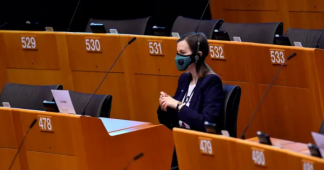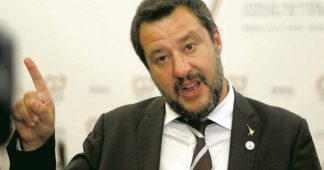By Lise Witteman, Peter Teffer
Nov. 3, 2021
The EU has set up a 723.8 billion euro recovery fund to help member states boost their post-pandemic economy. But there is a lack of democratic oversight on how those European billions will be spent. National parliaments have had limited involvement in the reform plans required to unlock the funds, a pan-European investigation reveals.
Compared to the summer of 2020, the world looked completely different when European Commission President Ursula von der Leyen travelled to Rome in June 2021 to discuss the Italian national reform and spending plan. A year earlier, the country was in the grips of Covid-19. The pandemic was ravaging across the continent, with no end in sight.
But in the summer of 2021, economies were opening up again. Von der Leyen could report that the vaccination campaign was ‘progressing, as well as the Squadra Azzurra’ – a quip referring to the Italian football team: just two days before Von der Leyen’s visit, they had emerged as group winner in the postponed Euro 2020 championship. Meanwhile, the European Union had set up a 723.8 billion euro fund to help its member states recover from the economic crisis caused by the pandemic.
Von der Leyen came bearing good news: the Commission had given Italy’s ‘recovery and resilience plan’ the green light. That is an intermediate step towards full approval by all member states, which is necessary to unlock Italy’s share. The Commission has reserved 191 billion euros for Italy, making it the largest recipient of the recovery fund’s grants and loans.
Italy’s plan not only included details on how the money will be spent but also which reforms it would carry out to make its economy more robust. ‘These are reforms the Italians have been wanting for years,’ said Von der Leyen. But there was one thing she probably did not know.
In a joint press conference with Von der Leyen, Italian Prime Minister Mario Draghi said several times that a majority of Italy’s Parliament had approved of the plan. However, the Investigative Reporting Project Italy (IRPI) revealed that MPs had voted on a plan that differed from the one sent to Brussels.
Without Italy’s chosen representatives knowing about it, some 400 million euros earmarked for ‘digitisation’ projects had been reallocated to ‘green transition and sustainable mobility’. Before sending the plan to Brussels, Draghi had also changed details on tax reforms, the reform of public administration payments plus a judicial reform.
Follow the Money asked the European Commission whether it knew that the version of the plan it had received – which Von der Leyen had praised as being ‘ambitious’ and ‘far-sighted’ when she was in Rome – was not the one that the MPs had debated. The spokesperson replied with a rather evasive answer: ‘The Commission provides its assessment of recovery plans presented to it by national authorities. The process by which the plans are approved prior to their presentation to the Commission for assessment – and the role of national parliaments in this process – is a national competence.’
The version that the Italian MPs had voted on was sent to them mere days before the debate, giving them hardly any time to read the nearly 300-page document. More than a week after MPs had given their approval, they received a 2,487-page document in English with never-before-seen details of the plan and annexes containing macroeconomic scenarios, timetables and other ‘technical’ aspects.
What happened in Italy is not unique, as research by a team of European journalists led by Follow the Money shows.
Several parliaments across Europe hardly had any say in the drafting of the plans or had little opportunity to propose amendments. This is alarming because it shows a lack of democratic control of how and where these billions will be spent and especially troubling because the payment of the recovery money is conditional on potentially controversial reforms.
Continue reading at www.ftm.eu
We remind our readers that publication of articles on our site does not mean that we agree with what is written. Our policy is to publish anything which we consider of interest, so as to assist our readers in forming their opinions. Sometimes we even publish articles with which we totally disagree, since we believe it is important for our readers to be informed on as wide a spectrum of views as possible.











